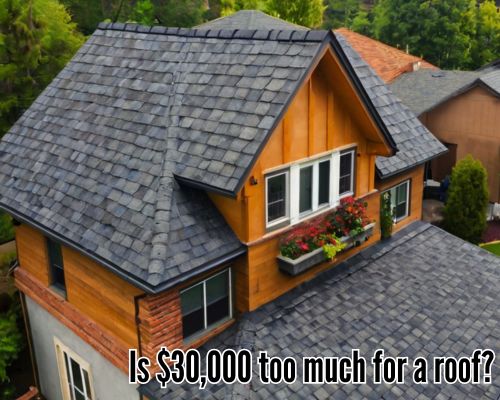
Is $30,000 Too Much for a Roof? A New Jersey Homeowner’s Guide to Roofing Costs
When faced with a roofing quote of $30,000, most homeowners ask the obvious question: “Is $30,000 too much for a roof?” In a state like New Jersey, where weather conditions, material costs, and property values can vary significantly by county, that question deserves a nuanced and informed answer.

With Charles Jimerson of CJ Commercial Roofing NJ, we’ll break down the factors influencing roof pricing in New Jersey, including material choices, labor costs, property size, and local economic conditions. If you’re unsure whether $30,000 is a fair quote—or a financial red flag—read on for insight that can save you time, stress, and money.
Understanding Roofing Costs in New Jersey
1. Average Roofing Prices by Square Foot
As of 2025, the average cost of a new roof in New Jersey ranges from $8,000 to $25,000 for most residential homes. Pricing is typically based on roof size, calculated in “squares”—a roofing square equals 100 square feet.
- Asphalt shingles: $4.50 – $7.50 per square foot installed
- Metal roofing: $8.50 – $14.00 per square foot installed
- Slate or tile: $15.00 – $30.00+ per square foot installed
- Flat roofs (TPO, EPDM, etc.): $7.00 – $12.00 per square foot
So, a 2,500 square foot roof (25 squares) could cost anywhere from $11,250 to over $60,000, depending on materials and complexity. That means $30,000 isn’t unheard of, but whether it’s too much depends on context.
What Factors Could Push a Roof Replacement to $30,000?
1. High-End Roofing Materials
If you’ve chosen premium materials like standing seam metal roofing, synthetic slate, or solar shingles, the price can easily exceed $30,000. These materials last longer and offer better energy efficiency, but come at a steep upfront cost.
2. Roof Complexity and Architecture
Houses with steep pitches, dormers, skylights, or multiple valleys and gables significantly increase labor time and risk. In towns like Montclair, Princeton, or Bernardsville, where architectural charm is prized, complex rooflines are common—and pricey to replace.
3. Tear-Off and Disposal Costs
If your old roof requires a full tear-off before installing the new one, expect an additional $1,000 to $3,000 for labor and disposal, especially if there are multiple layers of shingles or signs of rot in the decking.
4. Permits, Inspections, and Insurance
In municipalities like Newark, Jersey City, or Cherry Hill, roofing contractors must comply with local permitting regulations, building codes, and safety inspections. This adds both administrative costs and delays. Always ask if your quote includes permit fees.
5. Labor Costs in New Jersey
Due to higher living expenses in the Garden State, licensed roofing contractor in New Jersey charge more than the national average. Union labor, insurance, and liability coverage add further costs. That $30,000 may reflect not just material but premium, fully-insured craftsmanship.
Is a $30,000 Roof Worth It? A Value Breakdown
Rather than asking “Is $30,000 too much for a roof?”—ask what’s included in that $30,000?
✅ Red Flags to Watch Out For:
- No breakdown of material vs labor
- Vague warranty or no warranty at all
- Unlicensed or uninsured contractor
- Zero local references or poor reviews
- Subcontracted labor with no oversight
✅ Signs of a Fair High-End Quote:
- Itemized estimate with detailed scope
- Use of architectural or high-durability materials
- Inclusion of structural repairs or decking replacement
- Manufacturer-certified contractor status (e.g., GAF Master Elite)
- Extended warranties (25–50 years)
If the estimate includes premium materials, full tear-off, attic insulation upgrades, and high-quality flashing/ventilation systems—it could very well be a competitive price for long-term value, especially in high-cost counties like Morris, Hunterdon, or Bergen.
Local Roofing Cost Examples Across New Jersey
| Location | Roof Type | Size | Price Range |
|---|---|---|---|
| Hoboken | Flat roof (TPO) | 1,800 sq ft | $14,000 – $22,000 |
| Cherry Hill | Asphalt shingles | 2,400 sq ft | $9,000 – $17,000 |
| Princeton | Slate roof | 2,200 sq ft | $25,000 – $50,000 |
| Cape May | Metal roof | 2,000 sq ft | $20,000 – $35,000 |
| Westfield | Composite shingle | 3,000 sq ft | $12,000 – $28,000 |
💡Pro tip: Get at least three quotes from licensed New Jersey roofing contractors and check local reviews on Angi, HomeAdvisor, or the Better Business Bureau before making a final decision.
How to Get the Best Roof for Your Budget in NJ
- Compare Apples to Apples: Ensure all quotes are based on the same roofing material, number of layers removed, and ventilation system.
- Ask for Proof: Demand to see state license numbers, insurance certificates, and a copy of the warranty.
- Negotiate Smartly: Don’t just push for the lowest price. Focus on total value, reputation, and service scope.
- Timing Matters: Spring and summer are peak seasons. Consider scheduling your replacement during the off-season (late fall or winter) for better rates.
- Energy Rebates: Check for New Jersey Clean Energy Program rebates for reflective or energy-efficient roofing.
Final Verdict: Is $30,000 Too Much for a Roof in New Jersey?
It depends—but often, no, it’s not too much. A $30,000 roofing estimate in New Jersey could be justified by premium materials, challenging architectural design, or robust warranties. However, if you’re seeing that number for a basic asphalt shingle roof on a simple ranch house, it may be inflated.
Don’t fall into the trap of assuming price alone equals quality—or that a higher price always means you’re being ripped off. Vet the contractor, compare quotes, and understand the components that make up your estimate.
Conclusion: Protect Your Home, Protect Your Wallet
Your roof is the first line of defense against New Jersey’s ever-changing weather—from snow-packed winters in Paramus to humid, stormy summers in Atlantic City. A high-quality roof is an investment, not a cost to be cut.
So, the next time you ask, “Is $30,000 too much for a roof?”—remember, it’s not just about the number. It’s about what you’re getting in return.


